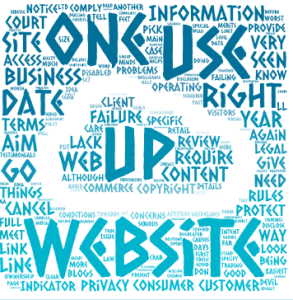Is your website legit?
 The internet is the new high street and your website, the shop window into which the whole world can peer.
The internet is the new high street and your website, the shop window into which the whole world can peer.
This is a fantastic opportunity, but there are a number of common compliance pitfalls that can trap the unwary. Falling foul of these can damage your business reputation and cost you money. With a website, it is very easy for regulators, such as the Information Commissioner, to check if the rules are being followed or not.
To help you avoid these pitfalls I have asked Wendy Briggs from Crimson Crab, reputation management and compliance specialists, to share her experience.
Here are the eight most common web content compliance mistakes that Crimson Crab have come across:
1. Failure to show full ownership details
This is one of the easiest things for regulator’s to pick up on. At the very least it is an indicator of negligence or a ‘devil may care’ attitude towards trading. In the worst case scenario, it could be seen as an indicator of more serious criminal intent that merits concealment. Most websites will need this disclosure, and it must be present when the website is used for e-commerce.
2. Failure to specify cancellation rights
An E-commerce website aimed at consumers is requited to meet certain additional rules. The main one that causes problems is the right of cancellation. Most purchasers have up to 14 days to change their minds and cancel any agreement. If you don’t tell them about their cancellation rights, this can go up to as much as one year. (That’s right, one year! )
3. Lack of relevant business information
Most service companies (operating either on or off-line) should give specific information to clients before doing business with them. For example a postal address, a telephone number and an email address are the bare minimum, whatever the business type. Other relevant information may include company legal status e.g.Limited Company or Community Interest Company. Membership of any authorisation schemes, as well as details of any guarantees, will also boost your credibility in the eyes of the customer. The idea is to let the client know whom they are dealing with and give some other useful information that helps customer confidence and provides consumer protection. For off-line businesses, with a website, one way of complying is to use a web page for this information. You can then give prospective customers a link.
4. Failure to have an up to date copyright notice
Although, not a legal requirement, most websites have some form of copyright notice. The issue here concerns the date. If your site only shows a past date, just how fresh is the content? Ideally the date should be the first year that the content was put on the site together with the date the latest content was added e.g. © Copyright Crimson Crab Ltd 2011-2015 all rights reserved.
5. Failure to have a privacy policy
Another complex area is privacy. It is all about being clear about what personal data you collect from your visitors and what it is going to be used for. The consequences of getting things wrong can be fairly substantial with maximum penalties of half a million pounds and size being no excuse for not knowing the rules. However, by far the biggest impact will be damage to your reputation. Customers will vote with their feet if you cannot guarantee their privacy. Related to this is the increasing use of “cookies“. These are pieces of code within your website that automatically gather information about the visitors to your site. You’ll need a ‘transparent’ cookie policy, which is in itself a minefield, as many businesses do not understand the law as it relates to cookies.
6. Lack of published terms and conditions
Although often seen as a legal nicety that no one will ever read, it is worth having a robust set of terms and conditions for use of your website. They can limit your liability if you are taken to court, as well as protect your rights to your content. A Court will look at your website terms so, you’ll need to take them seriously enough for them to stand up in court.
7. Your website doesn’t meet web accessibility guidelines for disabled visitors
The Disability Discrimination Act should aim to meet Level AA of the Web Content Accessibility Guidelines (WCAG) 2.0. It is good practice to comply and opens up access to a large group of potential customers.
8. Reviews and testimonials – too good to be true?
Finally a word about testimonials. The Competition and Consumer Protection Commission is looking at the way businesses use online reviews and endorsements after concerns were raised about their “trustworthiness” and “impartiality”. This will include those on web blogs, video blogs, social media, specialist review sites, trusted trader sites, retail platforms, and retailers’ websites. Something to be aware of?
Need some help?
If you want to take advantage of our free, quick website compliance check, please send an email with the address of your website to enquiries@crimsoncrab.net with “Insight WebCheck” in the subject line.
